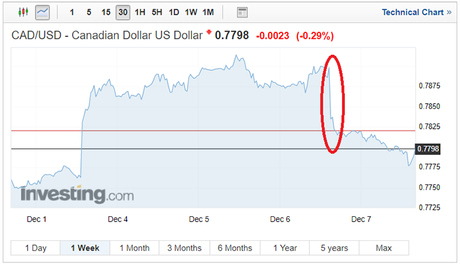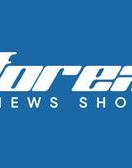The Canadian Dollar fell against the against the US Dollar as the Canadian central bank left rates unchanged at 1%. The hold which was completely expected markets was not the instigator for the Canadian Dollar loses, rather more the speculation over when the next rate hike may be.
Canadian unemployment and labor market
Investors were keen to hear Bank of Canada’s rhetoric following solid improvements in the Canadian jobs market. Last Fridays unemployment rate beat its monthly estimate of 6.2% coming in at 5.9%. Canada’s unemployment level has been fairly consistent coming in better than expected in 5 of the last 6 month’s readings. The latest reading now highlighting that unemployment is the lowest its been in over a decade.
Last Friday’s reports also highlighted the strength of the employment in Canada with November seeing 79,500 new positions filled in November, against a target of 10,200. Whilst the vast majority of roles added in November were part-time, 30,000 full-time roles were also added demonstrating the 12th straight month of improved Canadian employment.
For this reason, investors were keen to listen to the indication of when future rate hike may be implemented, however this month they were left wanting.
Bank of Canada concerned about uncertainties and business contraction
The Bank of Canada clearly remains very unoptimistic about the renegotiation of a NAFTA bill and with the US attempting to finalise their tax reform it clearly isn’t a priority for Trump. The next round of negotiations should be held on Canadian soil with Ottawa a likely location.
So far Canadia and Mexico have stood firm with the main sticking points being:
- Sunset clause, which would mean NAFTA would end after five years unless all parties agreed to continue it
- The rules of content for auto dispute settlement – essentially limiting the flow of low paid jobs in the automotive industry to Mexico and repatriating 85% of the installation to the US.
These are believed to be completely unviable for Canada and the US and remain the key point which are holding up progress on the renegotiation of NAFTA. In recent days the Canadian prime minister Justin Trudeau spoke openly about the hurdles facing NAFTA negotiations. The Prime Minister said that:
We’re ready for anything, when things come forward. The new administration has shown a willingness to disrupt the patterns of past behavior and look for new models, and we’re willing to entertain next steps forward.
Essentially clarifying that even if NAFTA was to halt he would openly discuss a trade deal or arrangement with president Trump.
Other reservations the Bank of Canada have circled around Canadian business productivity which shrank 0.6% in the third quarter, which highlighted repeated declines in the second and third quarter.
Previous Canadian interest rate hikes
The Canadian bank interest rate rise occurred in September with the previous being in July. These quick-fire interest rate rises followed seven years without a rate rise and investors have been left wanting since the end of last summer especially with a seemingly improving economy. Further delays will surely demonstrate a lack of confidence in the Canadian economy by the BOC and one would imagine that Canadian Dollar to US Dollar rates could be further impeded.
Canadian Dollar to US Dollar drops following lack of rate clarity
Following the latest rate announcement on Wednesday and the rationale behind the decision Canadian Dollar to US Dollar lost nearly a 0.5% in the aftermath with the rate dropping from CAD/USD 0.7898 to 0.7335.

Canadian Dollar to US Dollar losses were compounded when this month’s ADP non-farm payroll data was released in tandem showing a slightly better than expected result of 190K and offering the US Dollar more support, plus the dollar has benefitted from some wind in its sails as Trump get closer to his Tax reforms.
When are investors expecting Canadian interest rates to rise?
With the probability of an interest rate rise in January being cut to 26% from 41% pre-rate decision investors will await further compelling labor market gains. This will include more full-time job roles, continued low unemployment levels plus a solution on NAFTA. Whilst the latter is unlikely in the short term Prime minister Trudeau’s willingness to compromise with Trump may stand him in good stead, especially if Trump can get his Tax reforms through.

